matplotlib bars
Creating Bars
With Pyplot, you can use the bar() function
to draw bar graphs:
Example
Draw 4 bars:
import matplotlib.pyplot as pltimport numpy as npx = np.array(["A",
"B", "C", "D"])y = np.array([3, 8, 1, 10])plt.bar(x,y)plt.show()
Result:
Try it Yourself »
Example
Draw 4 bars:
Result:
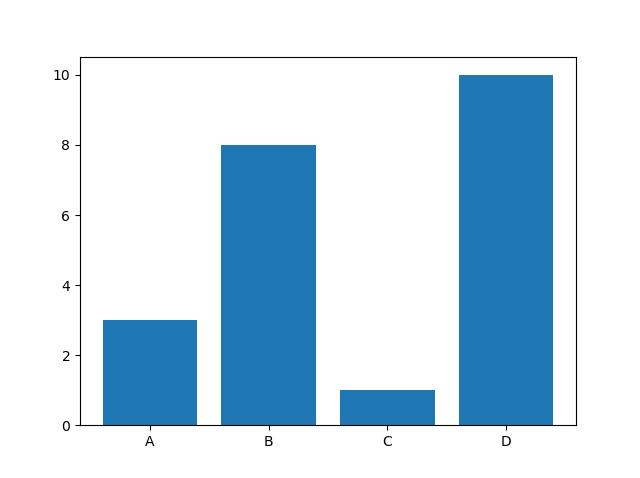
The bar() function takes arguments that describes the
layout of the bars.
The categories and their values represented by the first
and second argument as arrays.
Example
x = ["APPLES", "BANANAS"]
y = [400, 350]
plt.bar(x, y)
Try it Yourself »
Example
Try it Yourself »
Horizontal Bars
If you want the bars to be displayed horizontally instead of vertically,
use the barh() function:
Example
Draw 4 horizontal bars:
import matplotlib.pyplot as pltimport numpy as npx = np.array(["A",
"B", "C", "D"])y = np.array([3, 8, 1, 10])plt.barh(x, y)plt.show()
Result:
Try it Yourself »
Example
Draw 4 horizontal bars:
Result:
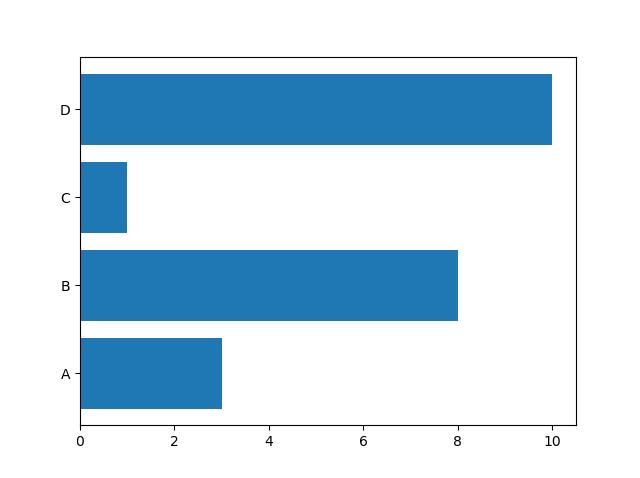
Bar Color
The bar() and barh() takes the keyword argument
color to set the color of the bars:
Example
Draw 4 red bars:
import matplotlib.pyplot as pltimport numpy as npx = np.array(["A",
"B", "C", "D"])y = np.array([3, 8, 1, 10])plt.bar(x, y, color = "red")plt.show()
Result:
Try it Yourself »
Example
Draw 4 red bars:
Result:
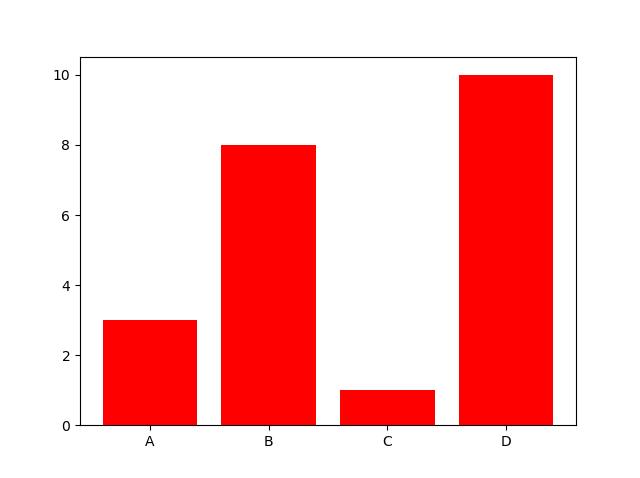
Color Names
You can use any of the 140 supported color names.
Example
Draw 4 "hot pink" bars:
import matplotlib.pyplot as pltimport numpy as npx = np.array(["A",
"B", "C", "D"])y = np.array([3, 8, 1, 10])plt.bar(x, y, color = "hotpink")plt.show()
Result:
Try it Yourself »
Example
Draw 4 "hot pink" bars:
Result:
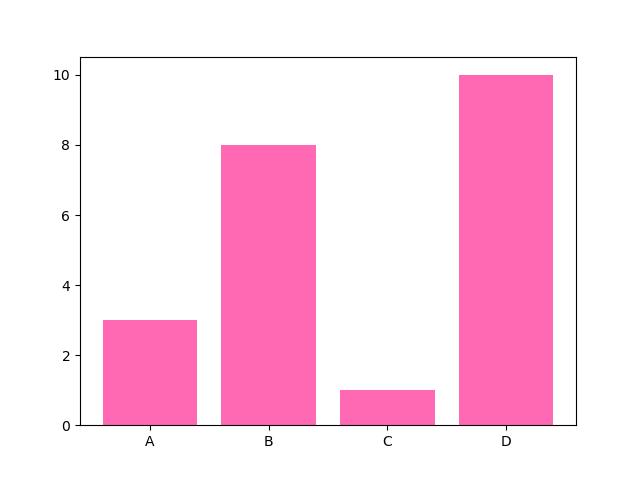
Color Hex
Or you can use Hexadecimal color values:
Example
Draw 4 bars with a beautiful green color:
import matplotlib.pyplot as pltimport numpy as npx = np.array(["A",
"B", "C", "D"])y = np.array([3, 8, 1, 10])plt.bar(x, y, color = "#4CAF50")plt.show()
Result:
Try it Yourself »
Example
Draw 4 bars with a beautiful green color:
Result:
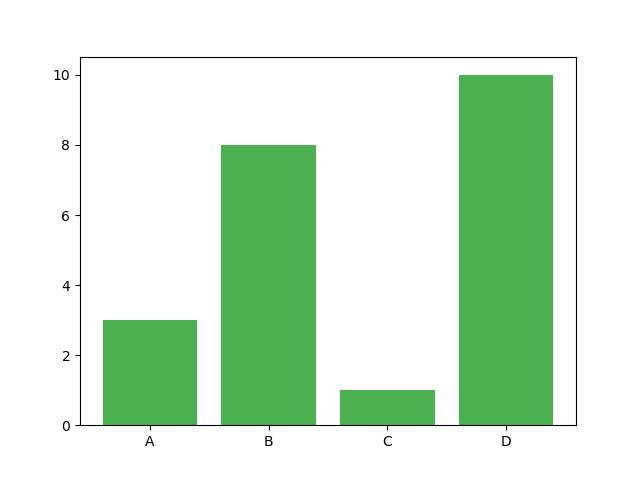
Bar Width
The bar() takes the keyword argument
width to set the width of the bars:
Example
Draw 4 very thin bars:
import matplotlib.pyplot as pltimport numpy as npx = np.array(["A",
"B", "C", "D"])y = np.array([3, 8, 1, 10])plt.bar(x, y, width = 0.1)plt.show()
Result:
Try it Yourself »
Example
Draw 4 very thin bars:
Result:
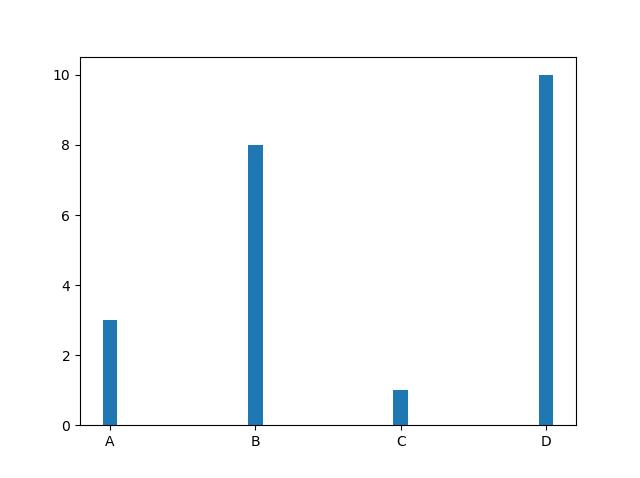
The default width value is 0.8
Note: For horizontal bars, use height instead of width.
Bar Height
The barh() takes the keyword argument
height to set the height of the bars:
Example
Draw 4 very thin bars:
import matplotlib.pyplot as pltimport numpy as npx = np.array(["A",
"B", "C", "D"])y = np.array([3, 8, 1, 10])plt.barh(x, y, height = 0.1)plt.show()
Result:
Try it Yourself »
Example
Draw 4 very thin bars:
Result:
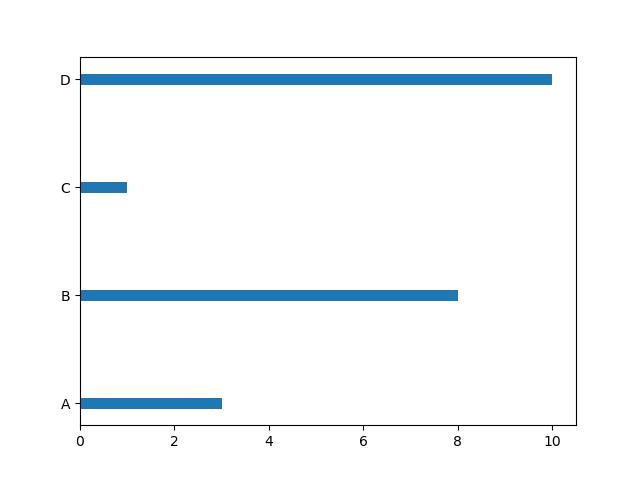
The default height value is 0.8









